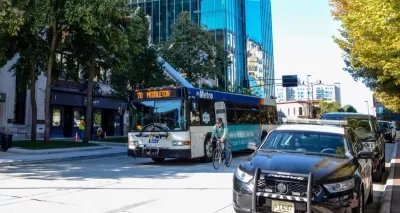
Construction is underway in Madison as the city works to become the second Wisconsin community to implement a revamped public transportation model known as bus rapid transit.
Bus rapid transit, or BRT, seeks to shorten commute times with more frequent stops at fewer, but more centrally-located stations.
Proponents say BRT harnesses some of the benefits of a light rail sytem, although bus rapid transit is much cheaper for local governments to implement. Rapid transit buses have dedicated lanes and are given priority at intersections. Riders can also pay fares ahead of time at BRT stations in an effort to cut down on delays during boarding.
Milwaukee County launched Wisconsin's first rapid transit line in June. Madison is working to follow suit, as work progresses on a BRT line that's set to come on line in late 2024. That east-west line known as Rapid Route A will run 15 miles from Madison's west side to Sun Prairie, the suburb northeast of Madison.
Madison Mayor Satya Rhodes-Conway said the transportation overhaul is needed to reduce congestion in Wisconsin's fastest growing city.
"It's also going to help us prepare for the influx of jobs coming to Dane County and, frankly, the influx of people," she said. "We know that our unique geography of being on an isthmus just simply can't support more folks driving alone in their cars, and it's critical that we make transit a viable opportunity for everyone in our community."
Madison officials expect to cover the project's estimated $194 million cost through a combination of federal grants and local funding. That includes a $110 million to help build the east-west line from a Federal Transit Authority grant.
Roadwork for the project began in 2022 and, as of this month, concrete work had been completed for about three quarters of the route's planned 31 bus stations, Madison Metro Transit General Manager Justin Stuehrenberg said.
Stuehrenberg said the first rapid transit buses will arrive in Madison next month, with the full fleet of 46 buses expected by next summer. Those 60-foot electric buses will have capacity for more riders compared to Madison's existing city buses.
"This is not your grandfather's bus," said Kelley Brookins, a regional administrator with the Federal Transit Authority. "BRT provides modern-looking vehicles that are faster and more efficient than the typical American bus."
Planning is underway to develop a second Madison-area BRT line, which could begin operations in 2027. Public input meetings for that north-south line began this month.
Read the full story here.